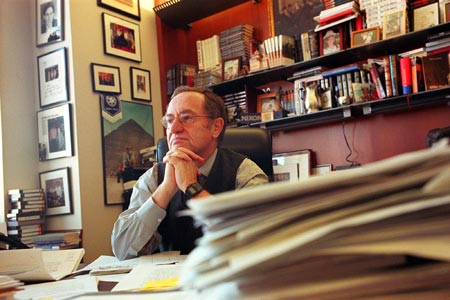Balancing act
Civil liberties and security

Alan Dershowitz, the Felix Frankfurter Professor of Law, has long been a defender of civil liberties. The Sept. 11 attacks on America have brought about some changes in his thinking and some readjustments of old beliefs to fit present circumstances.
Recently, Dershowitz discussed with the Gazette how Sept. 11 has impacted his opinions on civil liberties.
Dershowitz emphasized that while American presidents have curtailed civil liberties during wartime, the circumstances were different from today’s crisis. Lincoln’s suspension of habeas corpus during the Civil War, for example, was a measure the president had no intention of prolonging after the surrender of the Confederacy. But today’s war against terrorism can have no definite termination.
“In this war there will be no parades, no peace treaties, no ending date,” Dershowitz said. “So if the government is going to limit civil liberties, the best thing would be if they invoked sunset provisions, that is, laws that automatically end after two years. Otherwise, civil liberties may not be restored.”
The term “racial profiling” has been used in recent months to criticize those who propose interviewing Muslim men as a way of gathering information about terrorists. Dershowitz believes that it is important to be more precise in our terminology.
“The term racial profiling is among the most misunderstood and emotionally laden terms in the modern vocabulary of law enforcement and politics,” Dershowitz said.
Psychological profiling is a useful method used by law enforcement officers to hunt for certain types of criminals, such as child molesters and serial murderers. This type of profiling involves factors unique to certain individuals and does not touch on the volatile issues of race, ethnicity, or religion, Dershowitz believes.
“It is when profiling does involve these factors that it becomes understandably suspect, especially in a society like ours, with so terrible a racial history.”
However, even race may sometimes be relevant and permissible in certain kinds of profiling, as when a victim describes his assailant as a young black man. When color is one of the major identifying factors, it is permissible to limit the investigation to persons of that race.
Race or ethnicity also may be relevant when the crime has a racial or religious component, Dershowitz said.
“For example, in looking for Klansmen who may have lynched an African American, it would be foolish to look beyond the white community, since we know that all such racially motivated lynchings were committed by whites, though we also know that the vast majority of whites never committed a racial lynching.”
The same would be true of people of Islamic background.
“We know that all al Qaeda members, and certainly all al Qaeda suicide bombers, are Muslims. It is foolish, therefore, to misallocate our resources in the fight against suicide bombers by devoting equal attention to interrogating an 80-year-old Christian woman from Maine and a 22-year-old Muslim man from Saudi Arabia,” Dershowitz said.
On the other hand, arresting a 24-year-old male just because he was a Muslim – even a Muslim from Saudi Arabia – would not be permissible.
“True racial profiling of an impermissible nature occurs when all members of a particular race become suspect because of their race, ethnicity, and/or nationality alone,” Dershowitz said.
Dershowitz believes that the most extreme example of racial profiling in American history was the mass detention of Japanese-Americans during the Second World War.
“It didn’t work, and it made our nation guilty of inexcusable racism,” he said.
One idea that Dershowitz has changed his mind about is the use of identification cards for all citizens and temporary residents.
“I used to be against identification cards because they have been used in South Africa as a means of suppressing dissent, but I’ve changed my view,” he said.
Dershowitz said that his opinion is based on the distinction between privacy and anonymity.
“Some people have objected to the idea of identification cards because they believe that people ought to be able to disappear. I disagree with this view. I think there is confusion between the right of privacy and the right of anonymity. I don’t think people should be able to disappear. I think they should be able to maintain their anonymity under certain circumstances – when they’re handing out political leaflets or on the Internet, for example. But I don’t think that’s the same as privacy.”
Dershowitz believes that if everyone in the United States carried an ID card containing their name, address, Social Security number, a photograph, and either a fingerprint or retinal print, it would allow police to keep tabs on suspected terrorists while also stimulating debate about when police could ask people to identify themselves, and the result of such debate might actually be to cut down on racial profiling.
Another controversial view that Dershowitz has expressed recently is the idea that judges should be required to issue warrants allowing police to torture suspects. The view is not a new one for Dershowitz, nor is it one that has been fairly represented in the media.
First proposed on a visit to Israel in 1988, Dershowitz intended the idea as a way of reducing torture, not legitimizing it. He suggested that such warrants should be issued only in a “ticking bomb case,” situations in which the divulging of information by a suspect would save innocent lives.
“My suggestion was to say, why not introduce a legal procedure for going to a judge and applying for a warrant to use torture. The real intent would be to reduce torture to those rare cases where it’s probably going to be used anyway. A torture warrant would require judges to sign off on the use of torture and be held accountable for its misuses. This way, you introduce transparency and accountability into the proceeding,” Dershowitz said.
Contact Ken Gewertz at ken_gewertz@harvard.edu




